代词3
英语中的代词

英语中的代词英语中的代词英语作为一种广泛使用的语言,其中一个重要的语法范畴是代词。
代词在英语中起着重要的作用,它们在句子中代表了已经提到的人、物或事情。
这些代词通常用于简化句子结构,并使文本更加流畅。
在英语中,代词通常用于替代已经提到的事物,以避免重复。
它们可以替代名词、名词短语,甚至整个句子。
通过使用代词,我们可以更有效地传达我们的意思,同时使我们的文本不显得冗长。
英语中的代词有很多种,以下是一些主要的代词类型:1、人称代词:这是用来代替人的代词。
例如,我(I)、你(you)、他(he)、她(she)、它(it)、我们(we)、他们(they)。
2、指示代词:这些代词用于表示特定的对象。
例如,这个(this)、那个(that)、这些(these)、那些(those)。
3、疑问代词:这些代词用于提问中,用于询问人、物或事情。
例如,谁(who)、什么(what)、哪里(where)、何时(when)、怎样(how)。
4、关系代词:这些代词用于引导从句,并表示从句与主句之间的关系。
例如,谁(who)、什么(what)、哪里(where)、何时(when)、怎样(how)。
5、不定代词:这些代词用于表示不确定的或未知的人、物或事情。
例如,一个(a)、一些(some)、任何(any)、每个人(everyone)。
正确地使用代词可以帮助我们创建清晰、易于理解的文本。
也需要注意不要误用或错用代词,以免引起混淆或误解。
总的来说,英语中的代词是一个重要的语言工具,可以帮助我们更好地表达自己的意思。
小学英语语法代词小学英语语法代词:介绍、用法和注意事项在英语学习过程中,代词起着非常重要的作用。
尤其是对于小学生,掌握代词的用法能够更好地理解和运用英语。
本文将为大家介绍小学英语语法中的代词,包括其特点、用法和注意事项,以帮助孩子们更准确地使用英语。
一、代词的种类和特点在小学英语语法中,常见的代词有:人称代词、物主代词、反身代词、指示代词和不定代词等。
高三英语总复习课件:语法3代词

《 走 向 高 考 》 高 考 总 复 习 英 语 配 人 教 实 验 版
· ( )
必修二 例
Units 1-2 (2008·浙江)—I'd like some more cheese. B.none D.few
《 走 向 高 考 》 高 考 总 复 习 英 语 配 人 教 实 验 版 )
C.it
D.one
·
解析:句意:在西安市区租住房屋的费用比该市任 何其它的地方都要高。由四个选项看填一代词来代替名词
(
短语 the cost of renting a house; the cost 为不可数名词,
要用 that 表替代;this 不可用来表替代;it 指同名同物; one 只替代可数名词单数。 答案:A
· (
首页
上页
下页
末页
必修二
Units 1-2
(3)nothing意为“没有东西”,一般回答what提问的 句子。 —What's in the cave? 洞里有什么?
《 走 向 高 考 》 高 考 总 复 习 英 语 配 人 教 实 验 版 )
—Nothing.
没什么。 (4)neither指“两个人或物中一个也不,两者都不”,
《 走 向 高 考 》 高 考 总 复 习 英 语 配 人 教 实 验 版 )
就可接单数名词。
Would you please make it some other day ? ( = another day)改日做此事好吗?
· (
I have no other place to go.
我再也没有别的地方可去。
Nanjing in winter.
语法3-代词
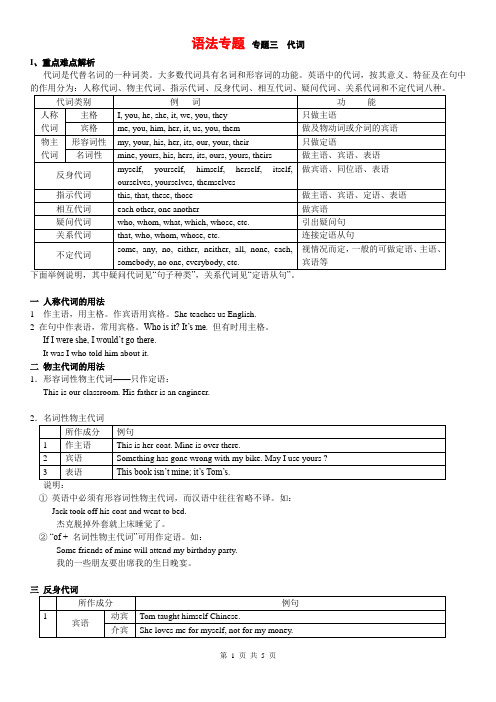
语法专题专题三代词I、重点难点解析代词是代替名词的一种词类。
大多数代词具有名词和形容词的功能。
英语中的代词,按其意义、特征及在句中下面举例说明,其中疑问代词见“句子种类”,关系代词见“定语从句”。
一人称代词的用法1 作主语,用主格。
作宾语用宾格。
She teaches us English.2 在句中作表语,常用宾格。
Who is it? It’s me. 但有时用主格。
If I were she, I would’t go there.It was I who told him about it.二物主代词的用法1.形容词性物主代词——只作定语:This is our classroom. His father is an engineer.2说明:①英语中必须有形容词性物主代词,而汉语中往往省略不译。
如:Jack took off his coat and went to bed.杰克脱掉外套就上床睡觉了。
② “of + 名词性物主代词”可用作定语。
如:Some friends of mine will attend my birthday party.我的一些朋友要出席我的生日晚宴。
四指示代词的用法1.时空的差别e.g. There is this seat here, near me, or there is that one in the fourth row. Which will you have, this or that?2. This 和that 在行文叙述上的差别。
E.g.I shall say this to you: he is a poor man. He was ill. That’s why he didn’t come.3.that 和those 用于表比较的结构。
The weather of Zhanjiang is better than that of my hometown. TV sets made in Nanjing are better than those made here.4. 打电话时this 表示我,that表示你.五不定代词的用法1.none, no one, nothing 的用法区别1)none 既可指人,也可指物,且一定是特指概念,常用来回答how many /much 引导的疑问句;no one 只能指人,且只能是泛指概念,常用来回答who 引导的疑问句;nothing “什么也没有”,否定一切,常用来回答what 引导的疑问句。
代词用法 三

常见不定代词的用法
1. some/any的用法比较
(1)一般用于肯定句中,表示“一些,某些; 某个” some (2)也可用于疑问句中,希望得到对方的肯定 回答或委婉提出建议与要求 any (1)一般用于否定句、疑问句及条件句和有疑 问含义的句子中,表示“任何一个/ 一些” (2)也可用于肯定句中,表示“任何”的意思
第一人称 myself
第二人称 yourself
第三人称 himself, herself, itself
复数
ourselves
yourselves
themselves
①Tom enjoyed himself in the Water Park. 汤姆在水上公园玩得很开心。 ②“I’ll teach myself. I’m sure I can do it by myself. ” Linda said to herself. 琳达心里想:“我要自学,我确定我能独立做它。”
①All of the boys in our class like Yao Ming.
我们班所有的男生都喜欢姚明。
②None can speak Japanese in our class.
我们班里无一人会说日语。
4. other/others/the other/the others/another 代词 区别 意义 other 泛指另 外的 others the other the others another 泛指三者 或三者以 上的另外 的一个 可单独使 用,也可 修饰可数 名词单数 或“数词 +可数名 词复数”
too. 乔有只宠物狗,它很可爱。我也想拥有一只像它一样的 (小狗)。
【温馨提示】it的其他用法
2015高考复习必备好资料之 高中中英语语法复习3代词

This is your book.
They are your students. Your eyes are big.
你的眼睛是大的。
第三人称
形容词性物主代词
单数 复数
Its nose is green.
I like her dog.
his(他的) her(她的) its(它的) their(他们的)
• 3.这是他的猫。这只猫是他的。
This is his cat. This cat is his.
• 4.这些是我们的香蕉。这些香蕉是我们的。
These are our bananas. These bananas are ours.
• 5.这是他们的汽车。这辆汽车是他们的。
This is their car. This car is theirs.
它的鼻子是绿色的。
我喜欢她的狗。 他们的老师是好的。 这是他的食物。
Their teacher is good. This is his food.
名词性物主代词
I --- my --- mine you --- your --- yours he --- his --- his she --- her --- hers it --- its --- its we --- our --- ours they --- their --- theirs
练习题
• • • • • This is ____ my ( I ) mother. His ___(He) name is Mark. you ( you) Miss Li ? Are ___ her ( she) brother. This is ____ my ( I ) book,yours This is ____ ____ (you) is over there.
3.代词
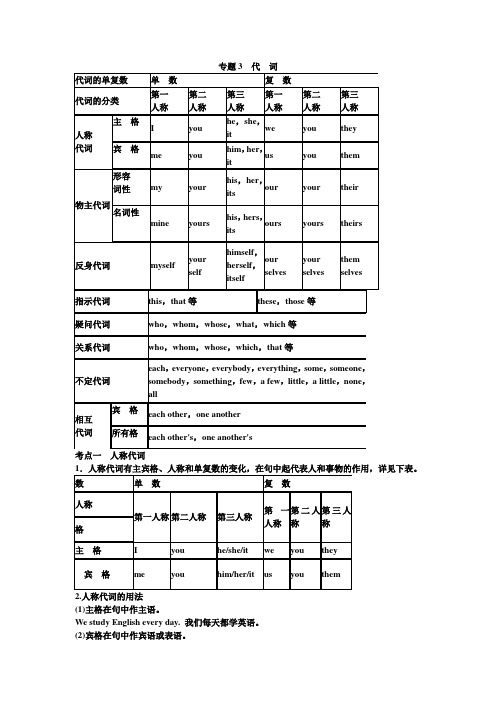
专题3代词考点一人称代词2.人称代词的用法(1)主格在句中作主语。
We study English every day. 我们每天都学英语。
(2)宾格在句中作宾语或表语。
I teach them English. 我教他们英语。
—Who is knocking on the door? 谁在敲门?—It's me. 我。
(3)it的用法。
①用作形式主语或形式宾语。
It is important for us to learn English well.对我们来说学好英语很重要。
I found it is important to learn English well.我发现学好英语很重要。
②用于指时间、人、天气和距离等。
It's cloudy today.(天气) 今天多云。
③用于强调句中。
It is Li Ming who is a doctor.当医生的是李明。
④代表前面提到过的事物。
I have a new pen.It is very beautiful.我有一支新钢笔,它很漂亮。
⑤用于一些固定句型中。
It's time (for sb.)to do sth.It is +时间段+since...It takes sb.some time to do sth.It's kind of sb.to do sth.(4)两个或两个以上的人称代词并列使用时,单数人称的顺序常为2→3→1(即你→他→我),复数人称的顺序为1→2→3(即我们→你们→他们)。
(5)I永远要大写,无论在句前还是句中,we,you,they均可用来泛指一般人,故译成汉语时不必译成“我们”“你们”“他们”。
she常用来代指国家、月亮、大地等。
考点二物主代词物主代词是表示所有关系的代词,有“形容词性”和“名词性”之分。
名词性物主代词多数是由形容词性物主代词后加-s构成。
但his和its的两种形式一样(后边只要一个s),而须有名词;而名词性物主代词后边不可再加名词,它在句中可作主语、宾语或表语。
3代词练习题.doc

代词练习题1.By the way, who will teach __ pop music next term?A. usB. ourC. oursD. we2.Everybody is here, _?A. isn't everybodyB. isn't itC. isn't heD. aren't they3.It was __ who wrote those words on the blackboard.A. heB. himC. himselfD. his4.He wants nothing but a house of.A. his own B, himselfc. his father D. his own house5.Can you express __ in English?A. yourselfB. youC. yoursD.yours'6.One of them hasn't got _lessons prepared.A. herB. itsC. one'sD. his7.You don't look quite ___ t oday. What's the matter with you?A. youB. yourC. your ownD. yourself8.Though _is a long way from here, we'll do our best to reach there in time.A. thereB. itC. itsD. itself9.We don't consider _necessary for them to move into that house.A. thatB. thisC. itD. them10. _ is a great and glorious country.A. OurB. OursC. ItsD. Our's11.His parents are going on a study trip with a friend of ___ .A. themB. theirC. themselvesD. theirs12.I'm sorry to say __ of your answers are correct.A. noneB. neitherC. bothD. any13.--- Who is that knocking at the door?-・-must be the milkman.A. HeB. SheC. ItD. The man14. _ agree to your plan.A. Anyone of usB. No one of usC. None of usD. Someone of us15.The books here are not so well written as ___ on the shelf.A. that B, thoseC. ones D. them16.My father is a farmer; but__ is yours?A. whoB. howC. whichD. what17. _ do you think of my composition?A. HowB. WhatC. WhichD. Why18. _ of you would like to get me the bike?A. WhichB. WhatC. WhomD. Whomever19.Please write on the paper __ line.A. each otherB. every otherC. all otherD. this and that20.Would you lend me ___ o f your money, please?A. anyB. manyC. someD. a lot of21.Sorry, but I have only _ i nk left over.A. littleB. fewC. a littleD. a few22._ who come from the countryside, please fill out the form.A. AllB. AnyoneC. TheseD. Those23.She went for a swim in the pool yesterday and I'll do __ this afternoon.A. itB. suchC. sameD. the same24.There're tall buildings on _ side of the street.A. eitherB. bothC. everyD. any25.must do ____ best to serve the people.A. One・・・hisB. One・・・herC.One・・・oneD. Ones・・・ones'26.He has quite a lot of interesting magazines but I have ___ .A. noB. noneC. no oneD. neither27.are fond of collecting stamps.A. Both the childrenB. Both of childrenC. My both childrenD. Both of the my children28.Of the 4 books, one is written by a young writer and ____ b y an old one.A. other three B, three otherC. the other threeD. the three other29.He invited the three of ___ , Bob, Tom and ___ .A. we・・・meB. us---lC. we・・・lD. us・・・me30.seems as if we are going to have trouble.A. WeB. ItC. ThatD. There31.Since you don't have a dictionary here, why not use ____ ?A. myB. mineC. herD. their32.This book is not mine. It belongs to __ .A. heB. hisC. him D, himself33.Be at home and help __ t o the fish.A. meB. himC. yourselfD. you34.Try to work out the problem __ .A. all by yourselfB. by youC. all by yoursD. by your35.The children seem to be enjoying ___ very much.A. themB. theirC. theirsD. themselves36.He always thinks more about others than about __ .A. heB. himC. his D, himself37.The police hid _ behind the building.A. himB. himselfC. them D, themselves38.After that, Madame Curie did one experiment after ____ .A. oneB. otherC. anotherD. the other39.You can find a tower at __ end of the bridge.A. bothB. everyC. eitherD. any40.- Have you got any books on the computer?-I'd like to borrow ____ .A. themB. someC. itD. those41.The most interesting books are not necessarily ___ with a lot of pictures.A. theseB. the onesC. themD. that42.The population of China is larger than __ of any country.A. oneB. the oneC. thatD. it43.People used to think that heavy objects always fell faster than light ___ .A. onesB. the onesC. theseD. those44.Is this story as funny as __ you read yesterday?A. that oneB. oneC. the oneD. it45.of them will accept your idea because it is not reasonable.A. NobodyB. No oneC. EveryoneD. None46.is good at French.A. My either childrenB. Either of my childrenC. Either my childrenD. My either of children47.1hope there are enough glasses for each guest to have ___ .A. itB. thoseC. themD. one48.-- When shall we meet again?---- Make it __ d ay you like, it's all the same to me.A. oneB. anyC. anotherD. some49.Tom's mother kept telling him he should work harder, but ____didn't help.A. heB. sheC. itD. which50.-- Is ____ h ere?---- No, Bob and Tim asked for leave.A. everybodyB. somebodyC. anybodyD. nobody51.Sarah has read lots of stories by American writers. Now she would like to read _______ stories by writers from countries.A. some; anyB. some; otherC. other; someD. other; other52 The family never agree about ___ shares of the property.A. herB. itsC, their D. his53.1was disappointed with the film. I had expected __ to be much better.A. oneB. thisC. thatD. it54.Saying something is one thing while doing it is ____ .A. otherB. the otherC. othersD. another55.It is generally considered unwise to give a child he or she wants.A. howeverB. whateverC. whicheverD. whenever56.---Is there any picture on the wall?A. NothingB. No oneC. No onesD. None57.You have to hurry up if you want to buy something because there's hardly____ leftA. somethingB. nothingC. anythingD. everything58.They were all very tired, but __ of them would stop to take a rest.A. anyB. someC. noneD. neither59.Tom felt that he knew everybody's business better than they knew it.A. themselvesB. oneselfC. itselfD. himself60.Think and you'll have some idea.A. overB. over itC. it overD. it61.1had a bad cold and is why I didn't attend the meeting.A. itB. thisC. thereD. that62.This is not such a good story I had expected.A. whatB. whichC. asD. that63.the homework seriously.A. No every student doB. No every student doesC. Not every student doD. Not every student does64.child will find his personal road to success.A. EveryB. EachC. SomeD. The65.We can't find our bikes. Have you seen them?A. anywhereB. somewhereC. nowhereD. where66.Jack is of an artist.A. anyoneB. someoneC. anythingD. something67.Tom sings better than in our class.A. any other girlB. some other girlsC. any girlD. some girl68.There's something wrong with my watch. Will you ___ ?A. see it toB. see to itC. watch to itD. see to look at it69.1didn't know which was the better so I took them.A. allB. eachC. noneD. both70.You will realize your dream.A. the other dayB. some dayC. in the daysD. for a few dayses first will be served first.A. WhoB. AnybodyC. All thatD. Whoever72.seems no need to hurry.A. ItB. ThatC. ThereD. He73.1have had enough cake. Would you like?A. one moreB. some moreC. any moreD. another one74. Taxes and death may come to, but they never come with impartiality.A. all menB. all of manC. all menD. all of men75 I have read you lent me.A. all of booksB. the all booksC.all the booksD.whole the books1-5 ACAAA 6-10 DDBCB 11-15 DACCB 16-20 DBABC 21-25 CDDAA 26-30 BACDB 31-35 BCCAD 35-40 DDCCB 41-45 BCACD 46-50 B DBCA 51-55 B CDDB 56-60 DCCAC 61-65 DCDB 66-70 DCBDB 71-73 DCB CC。
通用英语语法复习专题3 代词

代词
继续学习
高考复习讲义
考点全通关 9
3 every可用来表示"每隔",而each不可。
① every+基数词 +复数名词 ② every+序数词 +单数名词 ③ every other+单数名词 每隔一…… ④every few+复数名词 每隔几……
例 He visited his uncle every few days.他每隔几天就去看他叔叔。 例 Please write on every other line.请隔行写。
用作不定代词时,替代不可数名词;用作形容词时,修饰不可数名词。
例 Not many wanted to change their life in the town.镇上想改变自己生活的人并不多。 例 Many people are present now.现在有很多人在场。 例 The man didn’t say much about the accident.那个男子对那起事故没有说太多。 例 He is a poor man; he doesn’t have much money.他是个穷人,他的钱不多。
代词
继续学习
高考复习讲义
考点全通关 15
八、复合不定代词
某
任何
每个,所有
没有
人 someone/somebody anyone/anybody everyone/everybody no one/nobody
物 something
anything
everything
nothing
代词
继续学习
高考复习讲义
高考复习讲义
考情精解读 3
人称代词分类

人称代词分类
【原创实用版】
目录
1.引言
2.人称代词的分类概述
3.第一人称代词
4.第二人称代词
5.第三人称代词
6.结论
正文
【引言】
人称代词是代词的一种,用于指示说话人、听话人和其他人之间的关系。
在中文中,人称代词可以分为第一人称、第二人称和第三人称。
本文将对这三种人称代词进行详细介绍。
【人称代词的分类概述】
人称代词是用于表示说话人、听话人和其他人之间关系的代词。
在中文中,人称代词主要分为以下三种:
1.第一人称代词:表示说话人自身的代词。
2.第二人称代词:表示听话人的代词。
3.第三人称代词:表示除说话人和听话人之外的其他人的代词。
【第一人称代词】
第一人称代词表示说话人自身,包括以下几种:
1.我:表示说话人自己。
2.我们:表示说话人和其他人组成的群体。
【第二人称代词】
第二人称代词表示听话人,包括以下几种:
1.你:表示单数的听话人。
2.你们:表示复数的听话人。
【第三人称代词】
第三人称代词表示除说话人和听话人之外的其他人,包括以下几种:
1.他:表示单数的男性。
2.她:表示单数的女性。
3.它:表示单数的中性。
4.他们:表示复数的男性。
5.她们:表示复数的女性。
6.它们:表示复数的中性。
【结论】
总之,在中文中,人称代词分为第一人称、第二人称和第三人称。
第一人称代词表示说话人自身,第二人称代词表示听话人,第三人称代词表示除说话人和听话人之外的其他人。
人称代词3

I’m a girl. You’re a girl. He’s a boy. She’s a girl. It’s a cat.
三、按要求写单词。 1. you're (完全形式) 2. I’m (完全形式) 3. tall (反义词) 4. she is (缩略形式) 5. it is (缩略形式) 6. he’s (完全形式) 7. fat (反义词)
按照要求说句子。
7、 It is a cat .(改为一般疑问句)
Is it a cat ? 8、He is short .(改为一般疑问句) Is he short ?
肯否回答 :
一般疑问句常用Yes或No回答: 肯定回答: Yes,主语+be 否定回答: No,主语+be not.
一般疑问句
有Be动词的陈述句改为一般疑问句的 基本步骤 He is Peter.
①找出be动词 ②将be动词放到最前面 ③首字母大写,原来的首字母 改掉,其他照抄 ④句号改成问号
Is he Peter?
He is Peter. is he Peter . Is he Peter . Is he Peter ?
you are __________ __________ I am __________ short __________ she's __________ it's __________ he is thin __________
改写句子
例:I'm a boy. I'm Mary.
You’re a girl. It’s a pencil. He's tall. She's short. What’s it?
按照要求说句子。
初中英语语法之三代词(通用版)
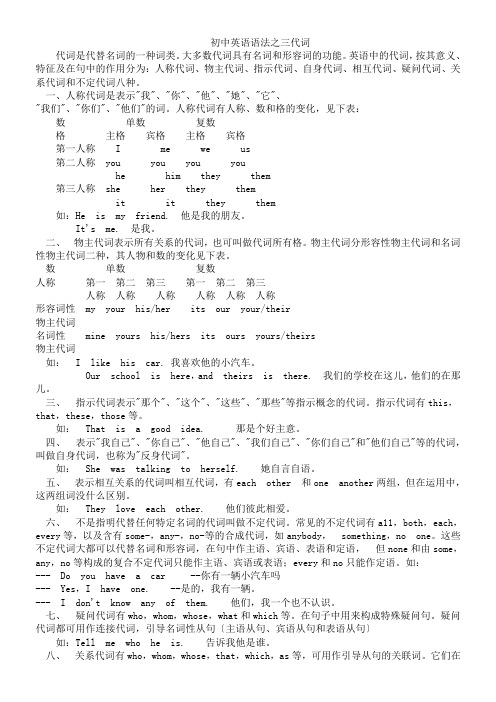
初中英语语法之三代词代词是代替名词的一种词类。
大多数代词具有名词和形容词的功能。
英语中的代词,按其意义、特征及在句中的作用分为:人称代词、物主代词、指示代词、自身代词、相互代词、疑问代词、关系代词和不定代词八种。
一、人称代词是表示"我"、"你"、"他"、"她"、"它"、"我们"、"你们"、"他们"的词。
人称代词有人称、数和格的变化,见下表:数单数复数格主格宾格主格宾格第一人称I me we us第二人称you you you youhe him they them第三人称she her they themit it they them如:He is my friend. 他是我的朋友。
It's me. 是我。
二、物主代词表示所有关系的代词,也可叫做代词所有格。
物主代词分形容性物主代词和名词性物主代词二种,其人物和数的变化见下表。
数单数复数人称第一第二第三第一第二第三人称人称人称人称人称人称形容词性my your his/her its our your/their物主代词名词性mine yours his/hers its ours yours/theirs物主代词如:I like his car. 我喜欢他的小汽车。
Our school is here,and theirs is there. 我们的学校在这儿,他们的在那儿。
三、指示代词表示"那个"、"这个"、"这些"、"那些"等指示概念的代词。
指示代词有this,that,these,those等。
如:That is a good idea. 那是个好主意。
四、表示"我自己"、"你自己"、"他自己"、"我们自己"、"你们自己"和"他们自己"等的代词,叫做自身代词,也称为"反身代词"。
常用代词大全

常用代词大全
一、人称代词
1.第一人称代词:我、我们
2.第二人称代词:你、你们
3.第三人称代词:他、她、它、他们、她们、它们
二、物主代词
1.第一人称物主代词:我的、我们的
2.第二人称物主代词:你的、你们的
3.第三人称物主代词:他的、她的、它的、他们的、她们的、它们的
三、指示代词
1.远指示代词:那、那个、那些
2.近指示代词:这、这个、这些
四、疑问代词
1.怎样的:什么样的、哪种、哪样
2.什么:什么、什么事、什么东西、什么地方
3.谁的:谁、谁的、哪个人
五、不定代词
1.一些:一些、一些人、一些东西、一些地方
2.任何的:任何的、任何人、任何东西、任何地方
3.所有的:所有的、所有人、所有东西、所有地方
六、反身代词
1.自己:自己、自己的、自己人
2.互相:彼此、相互、互相帮助
七、相互代词
1.所有:所有、所有人、所有事、所有东西、所有地方
八、关系代词
1.介词性关系代词:关系代词 + 介词
2.代词性关系代词:关系代词作主语或宾语
九、不定形容词性代词
1.某个:某个、某人、某事、某地
2.不同的:不同的、不同人、不同事、不同东西、不同地方
3.许多:许多、许多人、许多事、许多东西、许多地方
十、相对代词
1.哪一个:哪一个、哪一个人、哪一个事、哪一个东西、哪一个地方
2.任何一个:任何一个、任何一个人、任何一个事、任何一个东西、任何一个地方
以上是常用的代词大全,希望对您有所帮助。
初中英语语法大全汇总[3]代词
![初中英语语法大全汇总[3]代词](https://img.taocdn.com/s3/m/038c5310581b6bd97f19ea85.png)
初中英语语法大全汇总(三)代词(Pronouns)一、代词的分类:英语中代词分为:人称代词、物主代词、反身代词、指示代词、关系代词、疑问代词、连接代词和不定代词等等。
1 I often go shopping on Sundays.(我常去购物) / Are they from Brazil?(他们是巴西人吗?) / Where have theygone?(他们上哪儿去了?) / That’s it.(就那么回事) / It’s he!(是他!)2、宾格用来作及物动词或者介词的宾语。
如:Who teaches you English thisyear?(今年谁教你们的英语?) / Help me!(救救我!) / We often writeletters to her.(我们常给他写信)3、人称代词作表语或者放在比较状语从句连词than或as之后时,可以用主格形式,也可以用宾格形式,口语中大多用宾格。
如:--Who is it?(是谁?) –It’sI/me.(是我。
)4、三个不同人称同时出现,或者主语中包含“我”时,按照“you→he→I”的顺序表达。
如:Both he and I are working at that computer company.(我和他都在那家电脑公司上班) –Who will go there?(谁要去那儿?) –You and me.(你和我) 人称代词it除了可以指人指物之外,还可以表示“时间、天气、温度、距离、情况”等含义,此外还可以作“非人称代词”使用,替代作主语或者宾语的不定式、动名词或者名词性从句。
如:--What’s the weather like today?(今天天气怎样?)—It’s fine.(天气晴好) / --What’s the time?(几点啦?) –It’s 12:00.(12点) / It’s a long way to go.(那可要走好长的路) / It took him three days to clean his house.(打扫屋子花了他三天的时间) / It is very clear that the public want to know whenthese men can go into space.(很显然,公众想知道这些人什么时候能进入太空) / We found it very difficult to learn a foreign language well.(我们发觉要学好一门外语是非常困难的) 代词it 的用法:①指代前面提到过的事物。
专题3代词(原卷卷)---2023年中考英语考点详解专项训练
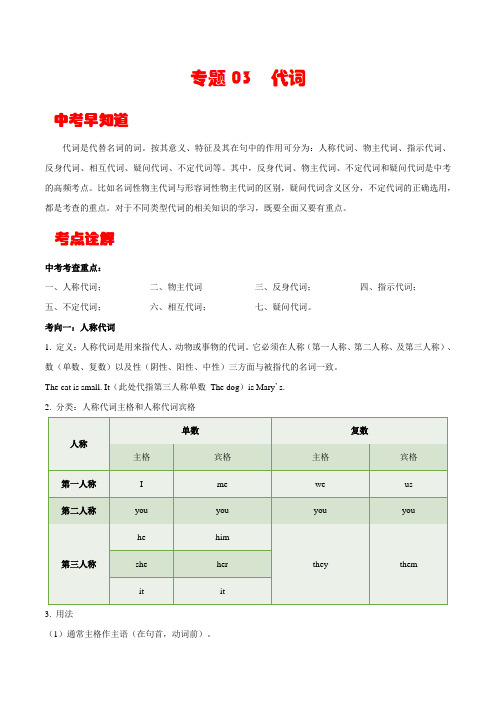
代词是代替名词的词。
按其意义、特征及其在句中的作用可分为:人称代词、物主代词、指示代词、反身代词、相互代词、疑问代词、不定代词等。
其中,反身代词、物主代词、不定代词和疑问代词是中考的高频考点。
比如名词性物主代词与形容词性物主代词的区别,疑问代词含义区分,不定代词的正确选用,都是考查的重点。
对于不同类型代词的相关知识的学习,既要全面又要有重点。
中考考查重点:一、人称代词;二、物主代词三、反身代词;四、指示代词;五、不定代词;六、相互代词;七、疑问代词。
考向一:人称代词1. 定义:人称代词是用来指代人、动物或事物的代词。
它必须在人称(第一人称、第二人称、及第三人称)、数(单数、复数)以及性(阴性、阳性、中性)三方面与被指代的名词一致。
The cat is small. It(此处代指第三人称单数The dog)is Mary’ s.2. 分类:人称代词主格和人称代词宾格人称单数复数主格宾格主格宾格第一人称I me we us第二人称you you you you第三人称he himthey them she herit it3. 用法(1)通常主格作主语(在句首,动词前)。
► He likes swimming. 他喜欢游泳。
(2)宾格作宾语(在动词或介词后)或作表语(在be动词后)。
► Can you understand me? 你能理解我吗?(作宾语)►—Who is knocking at the door? 谁在敲门?—It’s me. 是我。
(作表语)(3)人称代词在than之后与其他人或事物进行比较时,用主格和宾格都可以。
► Sam is much taller than I/me. 山姆比我高得多。
(4)单独使用的人称代词通常用宾格,即使它代表主语时也是如此。
►—I like travelling. 我喜欢旅游。
—Me too. 我也喜欢。
(5)人称代词并列时的排列顺序。
①人称代词单数并列作主语时,其顺序为:第二人称→第三人称→第一人称,即you, he/she/it and I(若是承担错误责任,第一人称应当先)。
第三人称单数
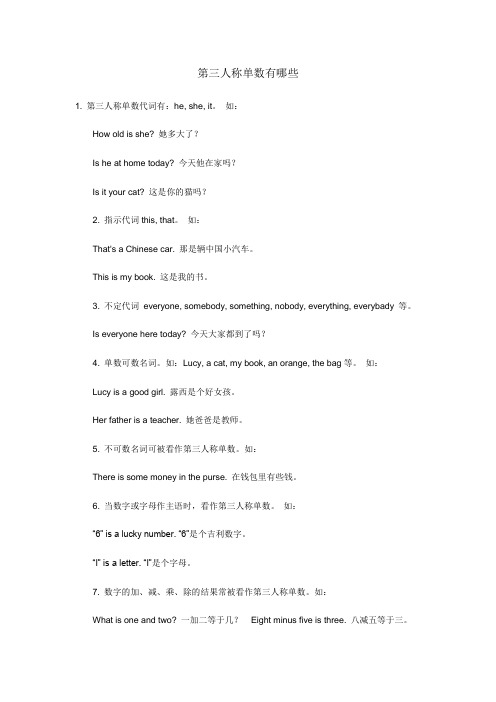
第三人称单数有哪些
1. 第三人称单数代词有:he, she, it。
如:
How old is she? 她多大了?
Is he at home today? 今天他在家吗?
Is it your cat? 这是你的猫吗?
2. 指示代词this, that。
如:
That's a Chinese car. 那是辆中国小汽车。
This is my book. 这是我的书。
3. 不定代词everyone, somebody, something, nobody, everything, everybady 等。
Is everyone here today? 今天大家都到了吗?
4. 单数可数名词。
如:Lucy, a cat, my book, an orange, the bag等。
如:
Lucy is a good girl. 露西是个好女孩。
Her father is a teacher. 她爸爸是教师。
5. 不可数名词可被看作第三人称单数。
如:
There is some money in the purse. 在钱包里有些钱。
6. 当数字或字母作主语时,看作第三人称单数。
如:
“6” is a lucky number. “6”是个吉利数字。
“I” is a letter. “I”是个字母。
7. 数字的加、减、乘、除的结果常被看作第三人称单数。
如:
What is one and two? 一加二等于几?Eight minus five is three. 八减五等于三。
英语代词用法归纳(3)

英语代词的用法全归纳一、定义与分类代词是代替名词及起名词作用的短语或句子的词。
代词根据其意思和用法可分为人称代词、物主代词、反身代词、指示代词、相互代词、疑问代词、连接代词、关系代词、不定代词九类。
综观历年高考情况,在这九类代词中,不定代词一直是高考英语的重点。
二:人称代词,物主代词,反身代词用法概述这三种代词都有人称(一、二、三人称)的变化、数(单、复数)的变化,以及性(阴性、阳性、中性)的变化。
其中,人称代词除了这三种变化外,还有格(主格、宾格)的变化。
物主代词又包括两种形式:形容词性物主代词和名词性物主代词。
特别注意:形容词性物主代词its没有相应的名词性物主代词。
这三种代词的形式变化表如下:人称单复数主格宾格形容词性物主代词名词性物主代词反身代词第一人称单数I me my mine myself 复数we us our ours ourselves第二人称单数you you your yours yourself 复数you you your yours yourselves第三人称单数he him his his himselfshe her her hers herselfit it its 无itself复数they them their theirs themselves三、人称代词的用法1) 定义:人称代词是用来指代人、动物或事物的代词。
它必须在人称(第一人称、第二人称、及第三人称)、数(单数、复数)以及性(阴性、阳性、中性)三方面与被指代的名词一致。
如:I am a student. Tom is a boy, and he is a student.Mary is very pretty, and she likes singing.The boys are students, and they are in the room.The doy is small. It is Tom's.2)人称代词的句法功能A) 人称代词有主格和宾语之分:主格用作主语,宾格用作宾语。
高考英语复习语法知识专题讲解3---代词(解析版)
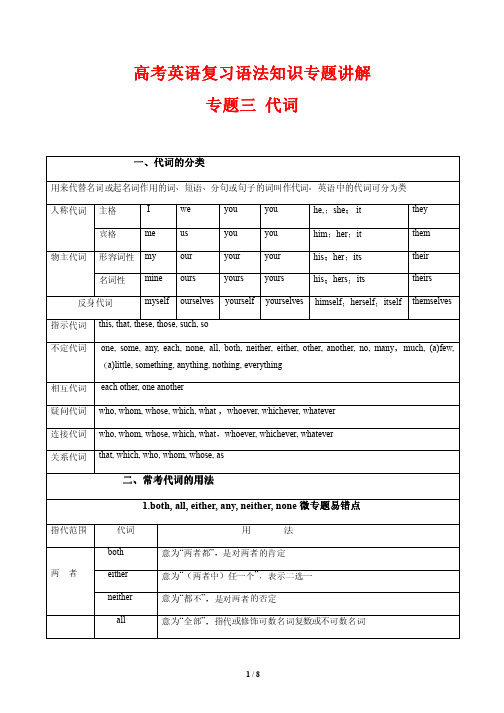
高考英语复习语法知识专题讲解专题三代词一、代词的分类用来代替名词或起名词作用的词、短语、分句或句子的词叫作代词。
英语中的代词可分为类人称代词主格 I we you you he,;she; it they 宾格me us you you him;her;it them物主代词形容词性my our your your his;her;its their 名词性mine ours yours yours his;hers;its theirs 反身代词myself ourselves yourself yourselves himself;herself;itself themselves 指示代词this, that, these, those, such, so不定代词 one, some, any, each, none, all, both, neither, either, other, another, no, many,much, (a)few,(a)little, something, anything, nothing, everything相互代词 each other, one another疑问代词who, whom, whose, which, what ,whoever, whichever, whatever连接代词who, whom, whose, which, what,whoever, whichever, whatever关系代词that, which, who, whom, whose, as二、常考代词的用法1.both, all, either, any, neither, none 微专题易错点指代范围代词用法两者both 意为“两者都”,是对两者的肯定either 意为“(两者中)任一个”,表示二选一neither 意为“都不”,是对两者的否定all 意为“全部”,指代或修饰可数名词复数或不可数名词三者或三者以上any 意为“任何一个”,指代或修饰可数名词单数或不可数名词none意为“全无,没有一点”,指代可数名词复数或不可数名词指物或人,其后可接表示范围的of...回答 how many/how much 的提问no one意为“没有人”,只指人其后不接表示范围的of...回答 who 的提问例:He is good at both English and French.You can take either of the pictures, whichever you like.It was a game in which neither team would win.Neither of us could understand German.All are happy to know the news.Phone me any day next week.We had three cats once but none(of them)is alive now.No one knows the answer.-How many of you have been to the Great Wall?-None.2.other, another 微专题易错点两者都意为“另一个”。
初中英语语法专项3代词

考点五 不定代词
1.定义 不指明代替任何特定名词或形容词的代词叫作不定代词。不定代词大多可以代替名词和形容 词。多数不定代词可以作主语、宾语、表语或定语。常见的不定代词有some, any, no, none, one, all, every, each, other, another, either, neither, both, many, much, (a) few, (a) little, a lot of, lots of以及some-, any-, no-, every-与-thing, -body或-one 构成的复合不定代词。
(3)(the) other, (the) others与another ①other泛指“另外的”,不能单独使用,后接名词。 ②others相当于“other+可数名词复数”,泛指别的人或物。 ③the other(+可数名词单数)指“两者中的另一个”,常用于“one…, and the other…”结构。 ④the others相当于“the other+可数名词复数”,表示“其余所有的人或物”。 ⑤another 泛指“三者或三者以上的人或物中的另一个”。 Do you have any other ideas? 你有别的想法吗? I have two brothers. One is a doctor, andthe other is a teacher. 我有两个兄弟。一个是医生,另一个是教师。 He is always ready to help others . 他总是乐意帮助别人。 Five of them are in the classroom.What abouthte others ? 他们中有五个人在教室里。其余的人呢? Don’t lose heart.Haveanother try. 别灰心,再试一次。
- 1、下载文档前请自行甄别文档内容的完整性,平台不提供额外的编辑、内容补充、找答案等附加服务。
- 2、"仅部分预览"的文档,不可在线预览部分如存在完整性等问题,可反馈申请退款(可完整预览的文档不适用该条件!)。
- 3、如文档侵犯您的权益,请联系客服反馈,我们会尽快为您处理(人工客服工作时间:9:00-18:30)。
--- May I use your mobile phone? There is wrong with mine.--- Sure.A. anythingB. nothingC. everythingD. something--________ toy is it on the floor?--It is Lily’s.A. WhoB. WhomC. WhoseD. What--________ was late for school today?--It is ________, sir, I am sorry.A. Who, meB. Whom, IC. Whose, myD. What, mine--Is there ________ in the fridge?--No, we should go and buy some.A. somethingB. anythingC. nothingD. everything--Look, ________ is in the sky?--A bird.A. HowB. WhatC. WhoD. Whom--My house is new and ________ is old. What about ________?--It is new too.A. your, hisB. yours, hisC. you, himD. yours, him________ is kind of you to help me with my English.A. ItB. ThisC. ThatD. There--Mothers can do ________ for their children.--I think so. Our mothers are great.A. everythingB. anythingC. nothingD. something--Is there ________ in the classroom?--No.A. anyoneB. someoneC. no oneD. none________ people go to the concert for jazz, but ________ people could understand that music.A. Many, fewB. Much, a fewC. Many, a fewD. Much, few--Tell ________ to bring back ________ English notebook.--OK.A. he, meB. him, mineC. him, myD. his, my--Jessica, what do you think ________ dress on ________?--Well, perfect.A. mine, meB. my, mineC. I, mineD. my, me--________ pen is it?--It is ________.A. Who, meB. Whom, myC. Whose, mineD. What, me Little John enjoyed ________ in his new school for the first day.A. heB. himC. hisD. himself.--I would like a cup of green tea.--________.A. I too.B. Also I.C. Also me.D. Me too.Donald is singing a song in her bedroom ________.A. herB. hersC. sheD. herselfThe old man lives in the countryside ________.A. heB. himC. hisD. himselfYesterday I went shopping ________ and met Julie, my old friend.A. mineB. myselfC. usD. ourselvesThese apples have gone bad. Please give me good _________.A. oneB. onesC. the oneD. the ones--Does ________ want another coffee?--No, thanks.A. someoneB. anyoneC. no oneD. all one-- Help _________ to some cakes, Tracy.--Thanks a lot.A. youB. yourC. yoursD. yourself--May I help you to carry the heavy box?--No, thanks. I can do it _________.A. by meB. for myselfC. by myselfD. for me--________ would you like to drink, coffee or cola?-- A cup of tea, please.A. WhatB. WhichC. WhyD. When--________ computers are there in the office?--35.A. How muchB. How manyC. How oldD. How long --May I have some sugar? The coffee is too black?--Yes, here you are.A. anyB. someC. allD. none-- ________ pocket money do you have a month?-- 100 Yuan.A. HowB. How muchC. How oftenD. How many There are ________ vegetables in the fridge. Please go and buy some.A. noB. manyC. muchD. littleI have ________ milk, so I can’t share it with you.A. a littleB. a fewC. not muchD. not many--________ students are there in your school.--2000.A. How manyB. How muchC. How oftenD. How long Jenny bought ________ new clothes yesterday. She liked them very much.A. manyB. muchC. littleD. few-- I would like to buy a book, but there is ________ money in my pocket. --Well, I can borrow you some.A. fewB. littleC. a fewD. a little________ people are on the street at midnight. Jenny felt afraid.A. FewB. LittleC. A fewD. A littleThere are ________ cities like Beijing that has a long history.A. not littleB. not fewC. not manyD. not muchI drank ________ milk just now and I felt sick.A. too muchB. to manyC. much tooD. many too ________ is your English teacher, Miss Wang or Mr. Lee?A. WhoB. WhoseC. WhichD. What--When ________ you usually go to bed?--At ten o’clock .A. isB. areC. doD. does--________ is your father?--Fifty.A. HowB. How oldC. How manyD. How much --________ colour is your skirt?--It is blue.A. WhatB. WhichC. WhenD. HowI bought a new dress for ________ yesterday.A. meB. myC. myselfD. mine--Please help ________, boys and girls.--Thanks, Mr. Wang.A. youB. yoursC. yourselfD. yourselves--Can you help me with ________ homework?-- Sure.A. IB. myselfC. mineD. my--Who teaches ________ English?--None. I learn it by ________.A. you, myselfB. your, meC. yours, meD. yourself, myselfAngel bought a bar of chocolate to ________ on her birthday.A. herB. sheC. hersD. herselfThe little boy is too young to dress ________.A. himB. hisC. himselfD. he--What do you think of the party last night?--Great. We enjoyed ________.A. weB. ourC. usD. ourselves--Who’s _________ man talking with your brother over there?--It is my uncle. He came back from American last month.A.a B.this C。
